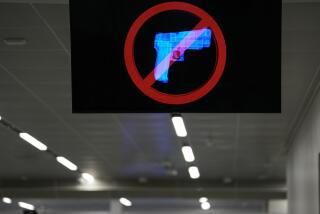Court Wants No Special Proof in Obscenity Cases
WASHINGTON — Police seizing allegedly obscene materials from dealers do not have to provide special proof before getting court authority, the Supreme Court ruled today.
By a 6-3 vote, the justices said the same standards apply when police seek court warrants to seize allegedly obscene materials as in cases where police seek to seize illegal drugs or weapons.
The ruling means videocassettes seized from a store in Depew, N.Y., in 1983 may be used as evidence in an obscenity prosecution.
A sheriff’s deputy took the films, with such titles as “Debbie Does Dallas,” “Deep Throat,” and “Little Girls Blue,” from Network Video, a store owned by P.J. Video Inc.
State Law at Issue
The store owners were charged with violating the state’s obscenity law but the New York Court of Appeals threw out the prosecution. It ruled that the affidavits used to obtain a court warrant authorizing the seizure described numerous sex acts in the films but did not establish “probable cause” to believe the films were obscene.
Led by Justice William H. Rehnquist, the Supreme Court today said the state court was wrong.
Rehnquist said the state court, without saying so specifically, required police officers to meet some higher standard of proof than the usual “probable cause” test before obtaining court warrants in cases of alleged obscenity.
“We have never held or said that such a higher standard is required by the First Amendment,” Rehnquist said.
Insurance Award Review
In another case today, the justices ordered further lower court review of a $5-million damage award against Aetna insurance company because an Alabama Supreme Court justice who ruled in the case had a personal stake in penalizing the company.
The justices, by an 8-0 vote, sent the case back to the state court for further study and said Justice T. Eric Embry--who had filed lawsuits himself against two other insurance companies accusing them of bad faith in refusing to pay insurance claims--should have disqualified himself from taking part in the earlier ruling.
Today’s decision left unanswered more sweeping questions raised by the case dealing with whether huge damage awards may violate the constitutional rights of insurance companies that act in “bad faith” in refusing to pay claims.
The case stemmed from a 1982 suit by Roger and Margaret Lavoie of Mobile, Ala., who accused Aetna Life & Casualty Co. of refusing for no valid reason to reimburse the couple for $1,650 in hospital bills.
Company Cited Costs
The insurance company claimed that Margaret Lavoie could have been treated as an outpatient at considerably less cost.
In December, 1984, the Alabama Supreme Court in a 5-4 ruling upheld a jury verdict that Aetna must pay the couple $3.5 million in punitive damages, plus an additional penalty of $350,000 and more than $1 million in interest.
More to Read
Sign up for Essential California
The most important California stories and recommendations in your inbox every morning.
You may occasionally receive promotional content from the Los Angeles Times.










